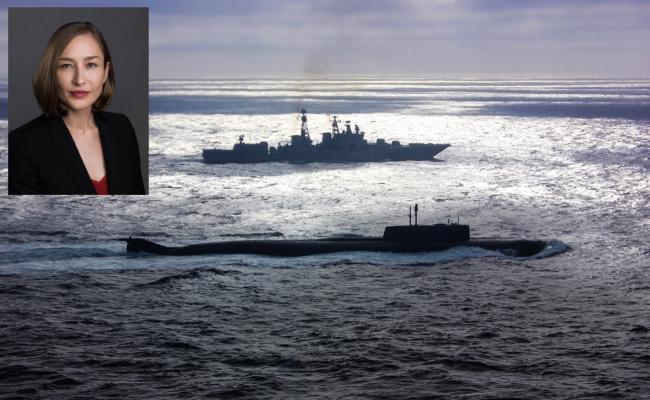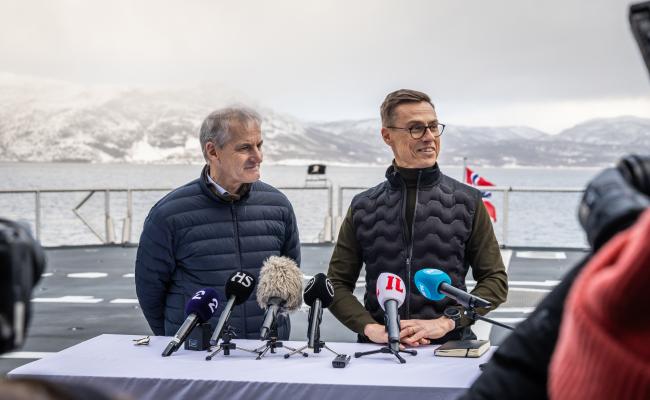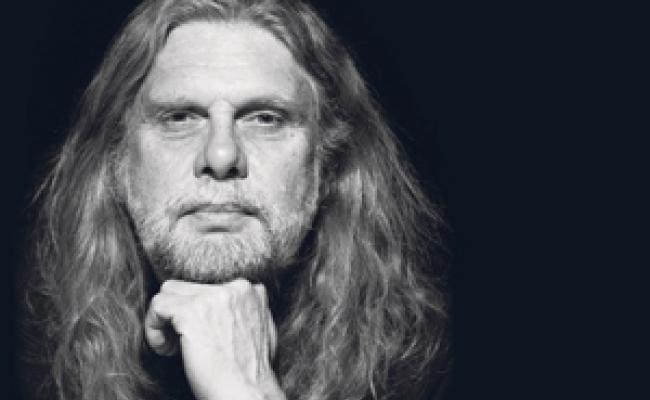PM Støre: "Norway Will Reach NATO's 2 Percent Target Already This Year"
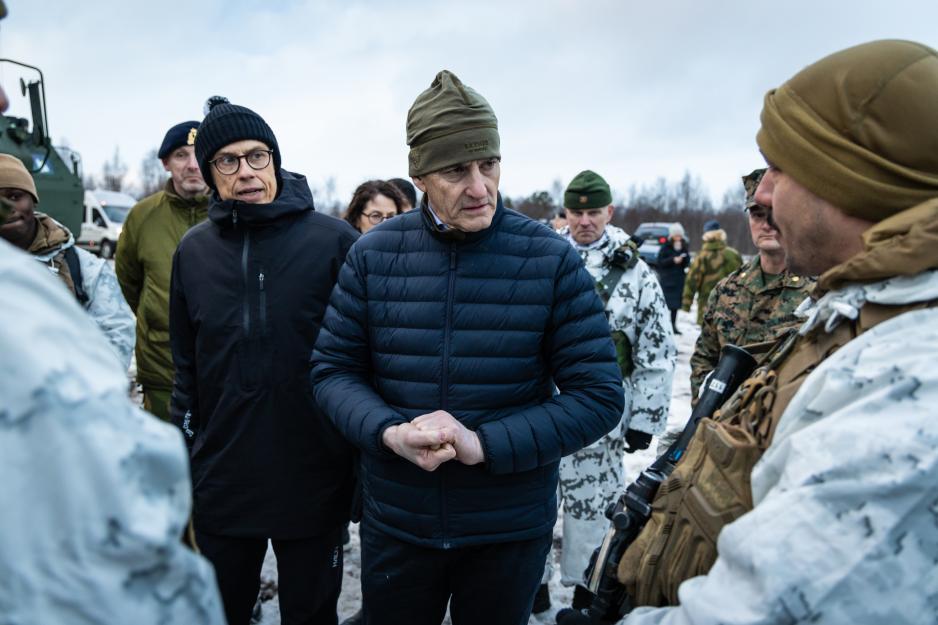
Last Thursday, Norwegian PM Jonas Gahr Støre visited the allied forces currently training in Western Finnmark, Northern Norway, during the major military exercise Nordic Response, together with Finland's new President Alexander Stubb. There, Støre said the government would consider whether Norway can reach NATO's two percent target sooner than it has previously planned, i.e. before 2026. For its part, Finland spent 2,4 percent of its GDP on defense last year – and will spend 2,3 percent this year, Stubb stated. (Photo: Kristian Kapelrud / the Norwegian Armed Forces)
The Norwegian government accelerates the country's achievement of NATO's defense spending target. "The situation out there and the needs here at home mean we must strengthen the Armed Forces now. We must live with a more dangerous and unpredictable Russia," says the PM.
The NATO countries agreed in 2014 that all were to commit two percent of their national gross domestic product (GDP) to defense spending by 2024, to help ensure the Alliance's continued military readiness.
Last spring, the Norwegian government announced a plan for the country to reach this target by 2026.
Yesterday, Thursday, the government announced that it now wants Norway to meet the 2024 deadline.
"The situation out there and the needs here at home mean we must strengthen the Armed Forces now. Norway will reach NATO's two percent target already this year. We must live with a more dangerous and unpredictable Russia, likely for a long time," says PM Jonas Gahr Støre (Labor) and continues:
"Many surrounding countries are investing in a greater and stronger defense. So are we. We will take responsibility for our own security and help shoulder the European security."
The news comes after Støre, with the Minister of Finance and the Minister of Defense, had their final meeting with the political parties in the Norwegian parliament before the government presents its suggestion for a new long-term plan for the Norwegian Armed Forces on April 5th.
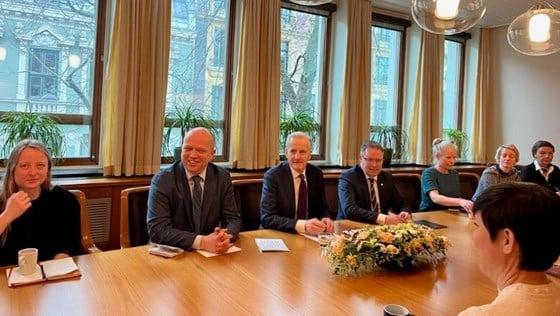
Norway's PM Jonas Gahr Støre – flanked by Minister of Finance Trygve Slagsvold Vedum and Minister of Defense Bjørn Arild Gram – during yesterday's meeting in the Norwegian parliament. The government has held regular meetings with representatives in parliament to develop a broad cross-party consensus around the main lines of the new long-term plan for the Armed Forces. (Photo: Marita I. Wangberg/Office of the Norwegian Prime Minister)
National security
More specifically, the government will propose additional allocations for defense purposes in the revised national budget, for which it will submit a proposal to parliament on May 14th.
"An increased investment in the Armed Forces also entails that a larger portion of joint funds will be spent on defense," writes the government.
In plain language, this means that other good purposes in the national budget must stick to the status quo or be given lower priority to realize such a defense investment.
"Creating security for people in Norway is our most important job as government. When the world is uneasy, we must spend more of society's shared resources on safety, defense, and national preparedness," says MoF Trygve Slagsvold Vedum (Center).
"Since coming into government, we have already strengthened the Armed Forces by 40 percent, but we will now take further steps to reach the two percent target. The strengthening will contribute to ensuring national control while also creating jobs and activity across Norway," he maintains.
Also read (Article continues below)
On it
"The government has taken several steps to make the Armed Forces function better. We have more people in place, spent funds to upgrade poor building stock – and we have lifted the Armed Forces in every budget," adds MoD Bjørn Arild Gram (Center) and continues:
"We will soon present an ambitious long-term plan for a bigger and better defense. We will continue improving what we have – and we will invest in a number of new capacities."
Regarding defense investments in and highly relevant to Northern Norway in this coming long-term plan, Gram has i.a. announced the following: Emphasis on the preservation of infrastructure for fighter aircraft in Bodø, higher ambitions for Andøya air station, and new Navy vessels.
He announced this in a speech at the Oslo Military Society in February.
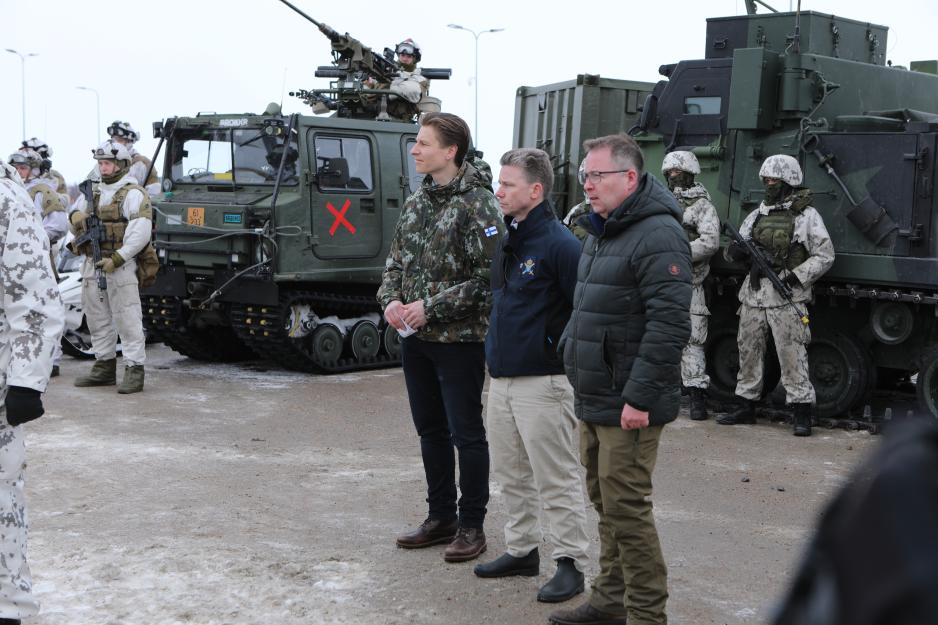
Norway's MoD Bjørn Arild Gram (to the right) with Sweden and Finland's defense ministers, respectively Pål Jonson (middle) and Antti Häkkänen, during a visit to the Nordic Response military exercise last Saturday. They were present as Finnish and Swedish infantry fighting vehicles crossed the Finnish-Norwegian border for the first time as NATO allies – this time at the Kivilompolo Border Station south of Alta in Western Finnmark. (Photo: Asgeir Spange Brekke / the Norwegian Ministry of Defense)
"Must expect greater Russian presence"
In the aforementioned speech, Gram also pointed out that Norway will likely face more Russian activity in the North in the time coming – partly due to Finland and Sweden's accession to NATO.
"NATO's border with Russia has now been doubled, and Russia has signaled that it will increase its military presence in the border area. The development [the alliance's Nordic expansion, ed. note] therefore encompass both challenges and opportunities for Norwegian security," stated the MoD and continued:
"We must expect greater Russian presence in our immediate areas. We must prepare for Russia to rethink its plans and where it deploys its forces as a response to the Finnish and Swedish NATO memberships."
The US presidential election
The possibility that Donald Trump will be re-elected president of the US in the fall is likely also a factor in the government's decision to accelerate the mentioned target achievement.
In a campaign event in February, Trump said he would encourage Russia to do "whatever they want" with NATO countries not investing enough in defense. In his former presidential term, he was very concerned with the member countries' financial contributions to the alliance.
Finland's recently resigned president, Sauli Niinistö, commented on this topic in his last speech:



